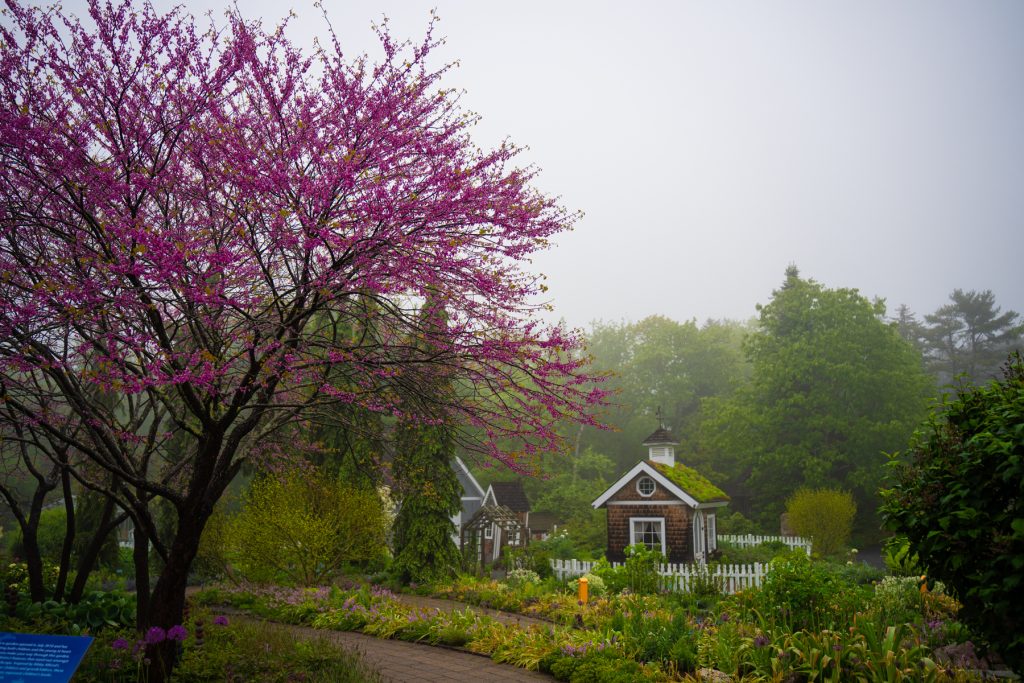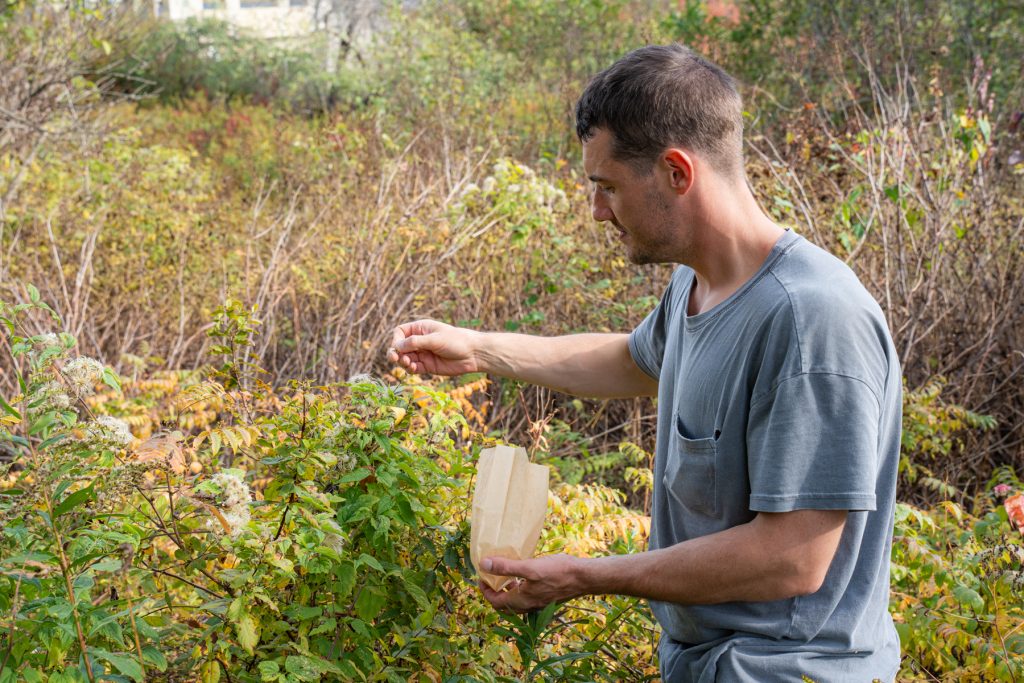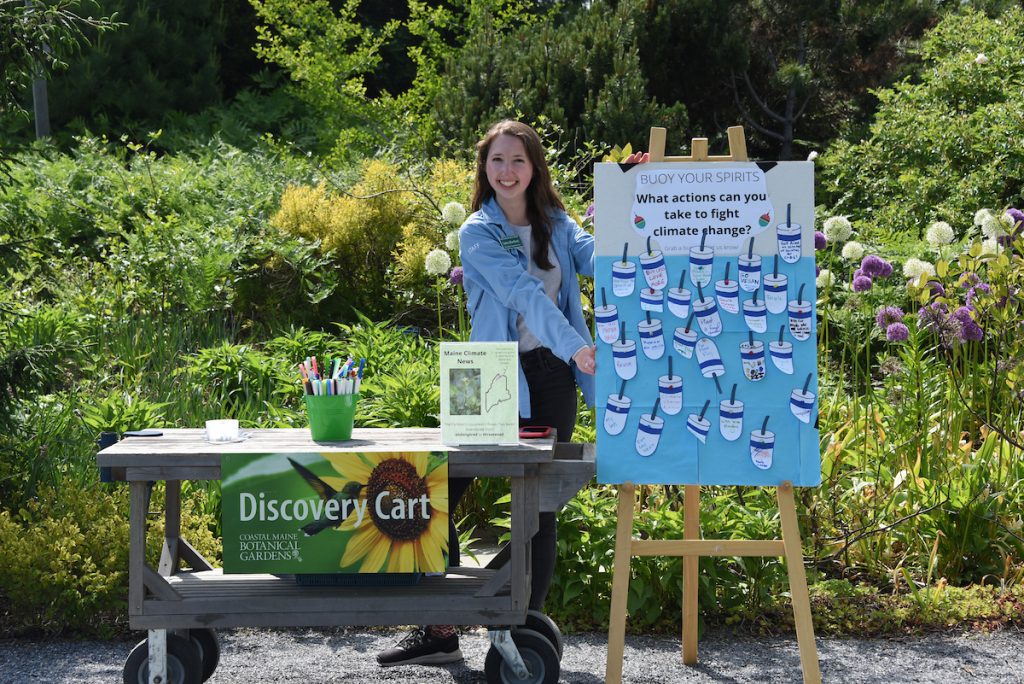Climate change isn’t a future global issue—it’s happening right now in our community, and it’s transforming the way we work at Coastal Maine Botanical Gardens. Our geographical proximity to both saltwater and freshwater offers a few extra degrees of winter warmth and cooler summers compared to other parts of mid-coast Maine. Historically, we have experienced mild springs, cool, rainy summers, and winters where the Gardens are well-insulated by snow.
But in recent years, the weather patterns we’ve come to rely on have become unpredictable. In the past five years, we’ve faced increasingly extreme and erratic weather, including droughts, intense storms, reduced snowfall, and flooding. These changes are affecting our plants, our practices, and our people.
Last year, we revised our mission statement to emphasize our commitment to conservation in the face of climate change. Across all departments, we’re taking meaningful action to ensure the Gardens thrive for future generations.
Here’s how each team is contributing to this urgent effort:
Horticulture: Adapting Practices for Resilience
Sourcing Local and Native Plants
The unpredictability of weather patterns has, on occasion, led to widespread plant loss in our gardens. Our horticulture team is focused on building a resilient plant collection to minimize loss due to these weather extremes. One way we’re doing this is by incorporating locally and responsibly sourced native plants, which are often better adapted to Maine’s changing climate. Two new examples include the beautiful showy tick-trefoil (Desmodium canadense), sustainably wild-collected from our own land, and northeastern beard-tongue (Penstemon hirsutus), which was responsibly sourced locally by a nursery in our own ecoregion.

Changing Gardening Practices
We’re rethinking how we care for our gardens, aligning with research that supports biodiversity and soil health. By leaving more plant material in place during fall and then delaying spring cleanup, we protect overwintering insects. This approach not only enhances soil quality but also supports beneficial pollinators and other wildlife.
We’re also diligently monitoring our collections and mitigating invasive pests like the Browntail Moth. Thanks to a mitigation grant, we’ve implemented strategies to manage their nests and reduce their impact on our gardens.
Our horticulture and collections teams have been collaborating to include more plants in our collections from warmer climatic situations just to our south, because Maine will have those conditions in the near future. One example is eastern redbud (Cercis canadensis), which presently reaches the northern limit of its natural range in southern New England but can be expected to move northward as our winter climates warm.
Updating Irrigation and Composting Systems
Water conservation is key in a changing climate. We’ve been transitioning to a smart irrigation system that adjusts based on real-time weather data, helping us maintain appropriate soil moisture levels that promote healthy plants.
Additionally, we’re enhancing our self-sufficiency by turning garden debris into woodchips and compost, which are reused on-site to enrich our soil. This reduces reliance on external resources and reduces emissions from transportation.
Plant Science: Supporting Migration and Preservation
Assisted Migration
Our Plant Science and Collections team is studying a new method of “assisted migration,” a strategy conservation biologists use to help plants move to more appropriate conditions in shifting climates. This assisted migration moves plants outside their present range only under close and careful observation (e.g., on public garden grounds) to study their success and behavior and assess whether and how relocation into the wild would be feasible and appropriate.
In collaboration with partners like Native Plant Trust (Farmington, MA) and Oak Spring Garden Foundation (Upperville, VA), we’ve moved eight rare plant species north of their natural ranges to our cooler climate here at the Gardens, since climates in more southern locations may soon become too warm and otherwise inhospitable. By closely monitoring these species in our gardens, we’re learning how they respond and whether relocation to the wild in our region might be feasible in the future.
Seed Conservation
Collecting seeds from plant populations at the northern and southern edges of their ranges helps us prepare for future restoration efforts. These “peripheral” populations often contain unique genetic diversity, which is important for successfully establishing new areas. These seeds will be important to future land restoration projects and assisted migration efforts. We’re excited to co-sponsor and host the 2025 New England Botanical Society conference on Plant Migration in a Changing Climate, where, with other biologists, we’ll share our work in support of plant migration.

Education: Empowering Individuals and Communities
Classes and Programs
We offer many different adult education opportunities for both home gardeners and horticulture industry professionals. These classes and workshops teach sustainable gardening practices, focusing on how individuals can support biodiversity, wildlife, and climate resilience. By adopting techniques like climate-resilient gardening, participants learn how to make a positive impact in their own backyards.
Informational Signage
Around the Gardens, visitors can find “Ecology in Progress” signs highlighting practices like leaving leaves and stems in place to create habitats for pollinators, amphibians, and birds. We’ve added these signs to demonstrate ways we’re changing our gardening practices to help make our gardens more resilient in the face of climate change, and to help guests understand how small changes can make a big difference for our ecosystems.
Tours and Discovery Carts
We invite guests to engage with climate change through free specialty tours and interactive Discovery Carts. On these tours, participants discuss how climate change affects their communities and explore how climate change is impacting both the landscape and our practices here at the Gardens. At the Discovery Carts, we ask thought-provoking questions like, “What brings you hope in the face of climate change?” and encourage visitors to share their knowledge and experiences. Addressing climate change is not only about technical solutions; it’s also about building our shared community resiliency.

Looking Ahead
At Coastal Maine Botanical Gardens, addressing climate change is a shared responsibility. From planting resilient species to conserving water, studying plant migration, and educating the public, every action we take contributes to a more sustainable future. Together, we can build a resilient, thriving ecosystem that supports both people and nature in the face of a changing climate. Thank you for being a part of it and for supporting the Gardens.

